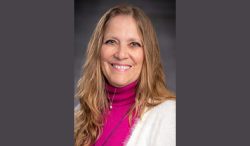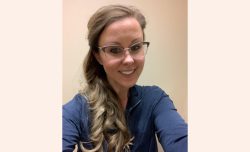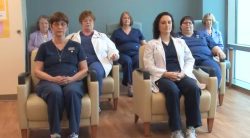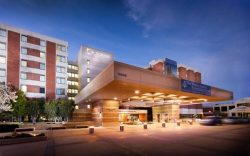Pandemic Front Lines: An Interview of Barbara Twombly RN BSN CWOCN

Barbara is a Certified Wound, Ostomy and Continence nurse at Scripps Memorial Hospital La Jolla in California who received her nursing degree at Russell Sage College and her WOCN Specialty training at Emory University. She has worked at Scripps Memorial Hospital for 35 years and took the Transcendental Meditation course at her hospital in 2017.
Question: This is a difficult time for everyone, but mostly for healthcare workers such as yourself. Did your training and past professional nursing experience prepare you at all for this COVID-19 related work?
No, nobody could ever have ever predicted the stress that nurses are experiencing caring for the COVID population of patients. The patients are so acutely ill and their medical status can change rapidly, requiring clear thinking and rapid response. The patients are anxious, stressed and acutely ill. There is added emotional stress placed on nurses because family members are not able to visit their loved ones, even as death approaches. The nurse is called upon to communicate and support families and this is very emotionally draining.
Q: How has your daily work been impacted by the pandemic?
My training is as a Certified Wound, Ostomy and Continence nurse. I cover the entire hospital and assess and train staff on how to treat skin and wound issues that are caused by the COVID-19 virus. Dealing with increased patient census in the Critical Care units, trying to communicate with patients while wearing PPE (personal protective equipment, such as face masks), the fear of contaminating myself while caring for the patient and bringing it home to my family, and teaching the already stressed staff are the challenges I face every day. A new area of focus for me involved the creation of a plan that would prevent skin injuries from occurring on personnel who were wearing PPE for long hours.
Q: Do you have any anecdotes to share with us that illustrate what you have been facing in recent months?
There are many patient scenarios that stay with me. There was a young patient, 39 years old, who was acutely ill with COVID, on a ventilator, requiring high oxygenation, and on multiple IV drips. He was with us for 2 months, but because of the great care given by our entire team, he was able to walk out of the hospital to go home to his family.
Q: Have you or close colleagues become ill with COVID-19 as a result?
Scripps Memorial Hospital has done a great job of protecting the staff. They have supplied ample PPE and are constantly reassessing our needs. Even with that, because we are taking care of COVID-19 patients, I do know of a few colleagues who have become ill.
Q: With such vulnerability and the stress of working on the front lines, let alone the hours involved and the emotional turmoil so many nurses have witnessed in patients and their families, how has the Transcendental Meditation technique helped you?
Practicing the TM technique every day has helped to keep me centered, and to be able to prioritize what is important, both in my professional and personal life. It has helped me to keep a positive attitude, to have clearer thinking and to have the energy to support other nurses. I find myself sleeping better, which decreases fatigue and increases my resilience.
Q: Do you think that TM is an important tool for health professionals for their own sakes and to enhance patient care?
YES! Self-care with daily practice of the Transcendental Meditation technique is a must for nurses, especially during this time with the added stresses placed upon us. Taking care of myself by practicing TM allows me to give better care to my patients and be available to staff. I am grateful that nurses at Scripps Memorial Hospital are given the opportunity to take the Transcendental Meditation course!





